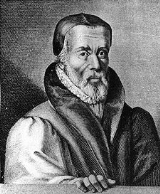
, who made the Greek New Testament available in Europe, and by Martin Luther
. Tyndale was the first to translate considerable parts of the Bible from the original languages (Greek and Hebrew) into English
. While a number of partial and complete translations had been made from the seventh century onward, particularly during the 14th century, Tyndale's was the first English translation to draw directly from Hebrew and Greek
texts, and the first to take advantage of the new medium of print
, which allowed for its wide distribution.
This word church has diverse significations.![]()
I defie the Pope and all his lawes. If God spare my life, ere many yeares I wyl cause a boy that driveth the plough to know more of the Scripture, than he doust.![]()
I call God to record against the day we shall appear before our Lord Jesus, that I never altered one syllable of God's Word against my conscience, nor would do this day, if all that is in earth, whether it be honor, pleasure, or riches, might be given me. ![]()
Lord ope the King of England's eies.![]()
Christ is with us until the world’s end. Let his little flock be bold therefore. For if God be on our side, what matter maketh it who be against us, be they bishops, cardinals, popes, or whatsoever names they will?
![]()
Mark this also, if God send thee to the sea, and promise to go with thee, and to bring thee safe to land, he will raise up a tempest against thee, to prove whether thou wilt abide by his word, and that thou mayest feel thy faith, and perceive his goodness. For if it were always fair weather, and thou never brought into such jeopardy, whence his mercy only delivered thee, thy faith should be but a presumption, and thou shouldest be ever unthankful to God and merciless unto thy neighbor.
![]()

